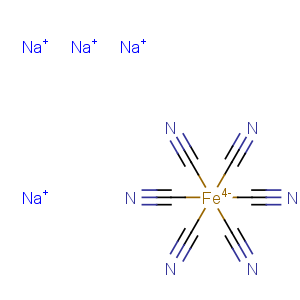Title: Sodium Ferrocyanide
CAS Registry Number: 13601-19-9
CAS Name: Tetrasodium hexakis(cyano-
C)ferrate(4-)
Synonyms: sodium hexacyanoferrate(II); yellow prussiate of soda; sodium prussiate yellow
Molecular Formula: C6FeN6Na4
Molecular Weight: 303.91
Percent Composition: C 23.71%, Fe 18.38%, N 27.65%, Na 30.26%
Line Formula: Na4Fe(CN)6
Literature References: Review of properties, chemistry and syntheses:
The Chemistry of Ferrocyanides, American Cyanamid Co. (Beacon Press, New York, 1953) 112 pp.
Derivative Type: Decahydrate
Properties: Pale yellow, monoclinic, slightly efflorescent crystals. Steady dehydration occurs >50°. Becomes anhydr at 81.5°. Dec 435°, forming sodium cyanide, iron, carbon, and nitrogen. Soly in water at 1°: 10.2% (calcd as the anhydr salt); at 17°: 14.7%; at 25°: 17.6%; at 53°: 28.1%; at 85°: 39%; at 96.6°: 39.7%. Practically insol in most organic solvents.
CAUTION: Do not mix with hot or concd acids and do not expose solns to sunlight for any length of time to avoid generation of hydrogen cyanide. Waste ferrocyanides in streams and lakes should not exceed 2 ppm because irradiated solns become toxic to fish, G. E. Burdick, M. Lipscheutz,
C.A. 44, 10939f (1950).
Toxicity: Because of strong chemical bondage between the cyanide groups and the iron, ferrocyanides have a low order of toxicity.
Use: Addition of sodium ferrocyanide solns to slightly acidic solns of iron salts causes precipitation of insol Prussian blue (ferric ferrocyanide), Fe4[Fe(CN)6]3. Alkaline solns yield sol Prussian blue, NaFe[Fe(CN)6]. Sodium ferrocyanide forms gels with heavy metals in general. Used in ore flotation. In photography for bleaching, toning, and fixing. To prevent caking of rock salt and foods. Additive to pickling baths. Peptizing agent in rubber. Arc stabilizer in welding rod coatings. Emulsion polymerization catalyst.

